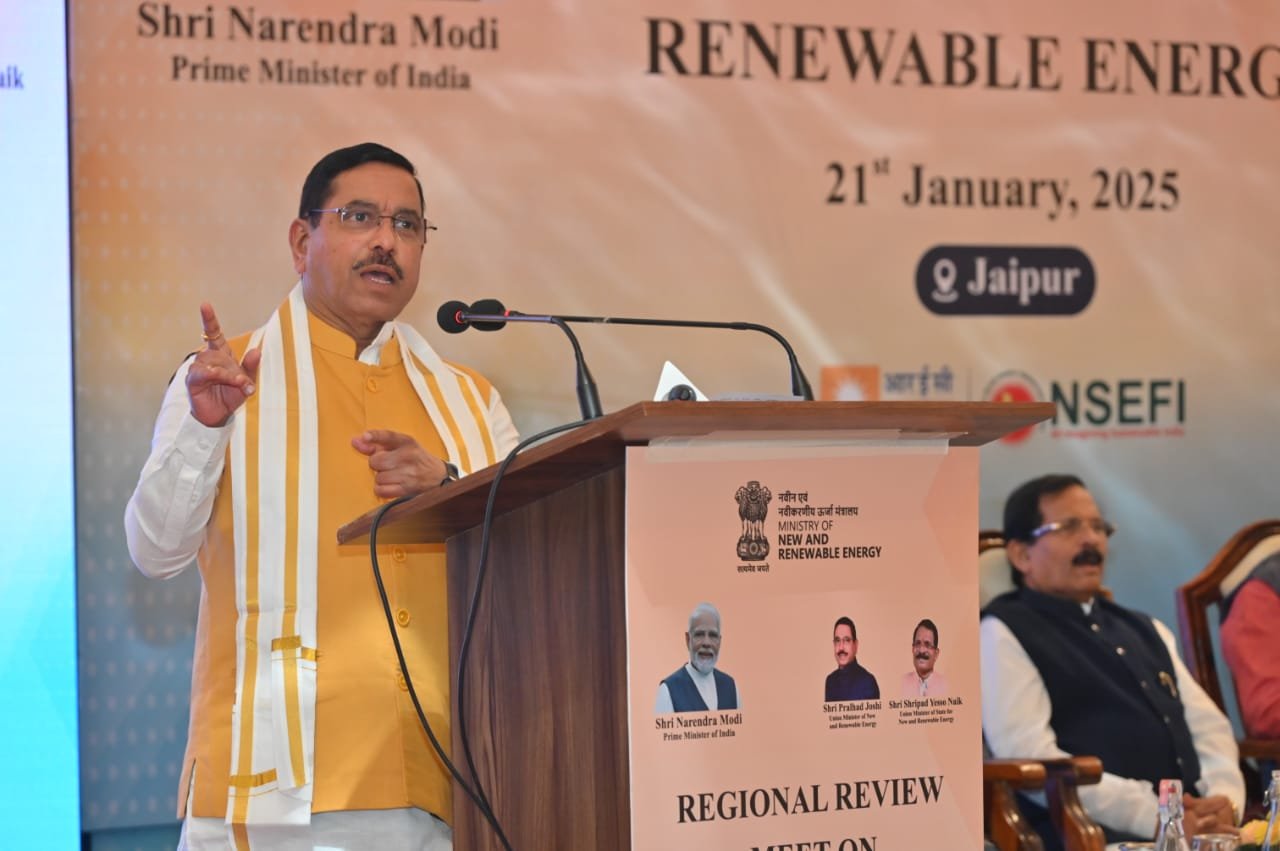India Targets 500 GW Renewable Energy by 2030: Key Insights from Regional Review Meeting in Jaipur
Shri Joshi emphasized the role of RE in India’s sustainable energy transition and the government’s adherence to the Panchamrit initiative from COP26.

- Country:
- India
Union Minister of New and Renewable Energy, Shri Pralhad Joshi, lauded India’s renewable energy (RE) sector as a global leader during the Regional Review Meeting on Renewable Energy held in Jaipur. He reiterated the government’s commitment to surpassing the ambitious 500 GW RE target by 2030 to meet India’s growing energy demands, expected to double by 2032.
The meeting reviewed RE developments in states including Jammu & Kashmir, Ladakh, Himachal Pradesh, Punjab, Chandigarh, Haryana, Rajasthan, Uttarakhand, and Uttar Pradesh. Key highlights included solar power advancements, incentives for rooftop installations, and the introduction of innovative policies to boost green energy adoption.
Shri Joshi emphasized the role of RE in India’s sustainable energy transition and the government’s adherence to the Panchamrit initiative from COP26. He highlighted the recent ₹32 lakh crore investment in the sector and India’s leadership in the green hydrogen economy, which aligns with the nation’s long-term energy security goals.
Key Announcements and Initiatives
-
Rajasthan’s Renewable Leadership:
- Allocation of an additional 5,000 MW under the PM-KUSUM Scheme.
- Inauguration of 1,200 MW solar projects in Jaisalmer.
- Progress in deploying 2000 MW Battery Energy Storage Systems (BESS).
-
State-Level Progress Reviews:
- Meetings held in Gandhinagar, Bhubaneswar, Kolkata, and Mumbai.
- Upcoming reviews planned in Visakhapatnam, Varanasi, and Guwahati to strengthen regional collaboration.
-
Incentives for Rooftop Solar Deployment:
- Jodhpur and Ajmer Discoms (Rajasthan): ₹39.43 crores and ₹17.59 crores.
- Haryana Discoms: ₹42.68 crores (Dakshin) and ₹22.43 crores (Uttar).
- Punjab Discom (PSPCL): ₹11.39 crores.
- Uttarakhand: ₹9.48 crores.
- Madhyanchal Discom (Uttar Pradesh): ₹9.51 crores.
Regional Leadership in Renewable Energy
Jammu & Kashmir:
Minister Shri Satish Misra highlighted the region’s solar installations exceeding 35 MW and the deployment of 3,000 solar pumps. He stressed the state’s potential in small hydro, wind energy, and the need for region-specific solutions.
Himachal Pradesh:
Shri Rajesh Dharmani outlined the state’s achievements, including a 1 MW green hydrogen plant, and targets for 100% non-fossil fuel energy by 2026. The state has over 75% green energy in its energy portfolio.
Haryana:
Shri Anil Vij emphasized investments in green energy infrastructure, reiterating the state’s commitment to sustainable energy goals.
Rajasthan:
Shri Heeralal Nagar detailed the state’s advancements, including 5,000 MW of renewable projects under PM-KUSUM and its 125 GW target by 2030. Rajasthan leads in solar, wind, and energy storage systems.
Renewable Energy Milestones and Targets
Ms. Nidhi Khare, Secretary, MNRE, shared that India has already surpassed 200 GW RE capacity, with:
- 97 GW from solar energy.
- 48 GW from wind energy.
- 52 GW from hydroelectric power.
Shri Sudeep Jain, Additional Secretary, MNRE, reaffirmed India’s commitment to achieving 500 GW by 2030 and 1,800 GW by 2047, urging innovative approaches to overcome challenges and enhance collaboration across states.
Global Collaboration and Policy Innovation
The meeting underscored India’s role as a global renewable energy leader through initiatives like:
- Green hydrogen projects for decarbonization.
- Deployment of distributed energy technologies and advanced battery storage.
- Enhanced collaboration with global and state partners to align with international standards.
The Regional Review Meeting in Jaipur highlighted India’s progress in renewable energy and its roadmap to achieve ambitious targets. With focused efforts on state collaboration, incentives, and policy innovation, India is set to lead the global transition to a sustainable, energy-secure future.
- READ MORE ON:
- Pralhad Joshi
- Renewable Energy










